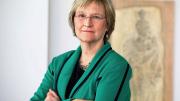Over the years, I have often been asked how many students attend Harvard, and I have quickly responded “about 22,000.” If you visit the official “Harvard At a Glance” page online, you will find this same figure.
But I have come to realize that “about 22,000” significantly understates the number of students who come to learn on our campus each year. It fails to acknowledge fully what is becoming an increasingly important part of our educational mission because it only includes those formally enrolled in degree programs. There is, in fact, another Harvard—a less visible but no less vibrant universe of learners who devote anywhere from a day to months of their time to deepening their knowledge in continuing and executive education programs offered throughout our schools. Their share in our community might surprise you: in any given year, Harvard educates approximately seven non-degree students for every one of its degree students (a figure that does not include the millions of learners we reach online through HarvardX).
Non-degree programs attract everyone from high school and college students to working professionals to retirees. They enroll with goals as varied as their interests are, seeking to challenge themselves with new material, to expand their understanding of a topic for the sake of their own enrichment, to enhance their careers in business, law, medicine, public health—the list goes on. Individuals from corporate and nonprofit organizations expand their skills alongside their counterparts as policymakers and public servants take time to discover common ground. Design programs invite practitioners to consider urban homes, real estate, and the walkable city; divinity programs provide intensive language study in Arabic, Greek, Hebrew, and Latin, and training for the teaching of religion in public schools; and humanities programs encourage wide-ranging explorations of art, history, literature, and philosophy. These examples offer just a glimpse of hundreds of learning opportunities that exist outside of traditional degree programs.
Underlying and driving these non-degree programs is the University’s mission to generate and disseminate knowledge, to reach out to committed and talented learners from around the world, and to share our intellectual resources with far more individuals than would otherwise be possible. Through diverse offerings that are online, in-person, or some combination of the two, we create the circumstances necessary for people to exchange ideas and to build relationships that lead to more success and opportunity than any one person could achieve on his or her own. Non-degree programs designed for business leaders and entrepreneurs; for education, health, and finance ministers; and for primary and secondary school principals, higher education administrators, and college and university presidents shape peer cohorts that support continued communication and growth long after coursework has concluded. At the same time, non-traditional learners, who are often active practitioners in their fields, provide our faculty with insights to incorporate into their case materials and other course content, as well as platforms to experiment with new pedagogical approaches and instructional technology.
Education, as one of my predecessors put it, “should be the work of the whole life.” A few years ago, I received a memorable letter from a successful Harvard Law School graduate who wanted to share with me his thoughts not on his degree program, which had served him very well, but on his non-degree program. Ten years after leaving campus, he returned for an executive education program and developed relationships that led to collaborations with faculty in both the Business School and the Medical School, as well as learning opportunities for undergraduate students. His experience represents, in my mind, some of our greatest aspirations for lifelong learning at Harvard: deeply engaging programs that expand knowledge, spark and sustain connections, and improve the lives of individuals. These aspirations will continue to guide us as we think about and plan for a future in which the University reaches more people in more ways than ever before in its history. This will be the century of lifelong education, and Harvard is poised to lead the way.









